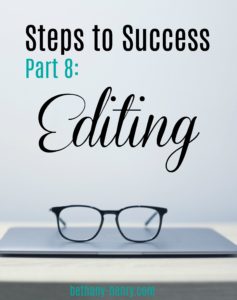Ever stop reading something because of a spelling mistake? Find yourself twitching when someone misuses their/they’re/there? Shake your head over a typo?
I have.
This is why editing is important.

The Importance of Editing
Whether we plan to submit our work to an agent, self-publish, or take our work down a different path: editing is vital. Mistakes will mark as as an amateur and cause our work to be disregarded.
Besides, we owe it to our work to make it the best we can! We’ve made it this far- now it’s time to bring our stories as close to perfection as possible.
This post is Part 8 of the Steps to Success series designed to walk us through the process of writing a novel from beginning to end. As always, personal preferences and experiences differ. This guide is based in part on my own experiences as well as from authors I have worked with and/or learned from along the way.
Find steps 1-7 here:
- Getting Started (where we look at our goals for writing and find our starting point)
- Developing Content (where we dig a bit deeper into what story we want to tell)
- Creating an Outline (where we brainstorm the basic structure of our story)
- The First Draft (where we get our writing plans in place and start our story)
- Rest (where we set our writing aside to breathe)
- Revising Our Writing (where we look at the revision process)
- Beta Reading (where we get feedback on our writing)
If you haven’t looked at the earlier steps in this series yet, I would encourage you to do so. In order to have our story ready for editing we want it to be the best it can be after all!
To start off: revisions and editing are not the same thing.
- Revising our novel is when we are clarifying and correcting the content of our writing. This includes developing our theme, strengthening our characters, and fixing our plot.
- Editing is focused on correcting any errors in the writing itself. This includes spelling, grammar, typos, and punctuation.
Because revisions deal with the content of our story itself it makes sense to complete these changes first before doing major editing editing. After all, we don’t want to fix every comma just to change the story around again.
But how do we know if our story is ready for editing?
Ideally we’ve gotten some feedback on our work already and have completed at least one round of revisions. There isn’t a magic number of revisions to complete before we’re ready to call it done and move on to editing. Basically we want to finish making any changes we’ve identified as issues in our story.
We want it as strong as we can make it.
The thing is, we may never be ready to let our story go. Moving forward can be hard. I mean, I could probably keep making nit-picky changes and revisions forever. Saying it’s “done” just seems so final.
Once we’ve gone through our story revisions and made the changes we wanted to make, it’s time to let things go and move on to editing. This is where we’ll stop changing the story itself and instead work on proofreading to correct any mistakes with spelling, grammar, typos, etc.

3 Strategies For Editing Our Stories
As we move past revisions and into our edits, here are a few strategies that can help us make our stories shine.
1- Find Books and Resources To Guide Us
Reading books is almost always my go-to for learning things. After all, other people have certainly struggled with what I’m working on so why not learn from them?
This is a book I’ve recently read and found encouraging and helpful while editing. I hope you find it useful too! Check out my reading list of book recommendations if you’re looking for more reading.
Note: This is an affiliate link so if you make a purchase I may receive a small commission at no extra cost to you. Don’t worry, I only recommend products I actually use and believe are helpful.
S
Filled with examples and explanations, I found this book to be approachable, informative, and interesting. Definitely a good read for anyone wanting to improve their writing and editing!
2- Get Connected With Others
Besides reading books, another strategy is to ask for help with our editing.
We’ve talked earlier about the importance of having beta readers who will look at our work and provide critical feedback. Hopefully we’ve been able to get some story feedback and advice to guide our revisions.
Having beta readers are also super helpful when it comes to editing our novel. If you know any readers who are great detail catchers and spell checkers, they can be prime candidates for helping with story edits. If they’re willing to take time to look over our work they’ll be able to recognize mistakes we’ve missed.
Being connected with people who support our writing can also help us to keep going and to not grow discouraged!
3- Self Editing
Along with reading books and working with beta readers, at some point we need to just sit down and do some serious editing ourselves. We want to make our work outstanding!
Yet sometimes it can be hard to focus on our writing in order to identify and fix mistakes. We get bored. We’re tired. The words are familiar to us and so sometimes we don’t even look at them. Or maybe we get distracted and caught up in our story.

Here are some tips to help us see our own work clearly as we edit:
- Print out and read a paper copy
- Mark any errors that we find
- Read chapters out of order
- Change the font
- Change font size
- Read it aloud
- Have someone else read it aloud
- Read backwards
- Look up anything in question (spelling, commas, etc)
- Make notes of anything to follow up on
- Take breaks- this will help us stay focused and not burn out
And be excited to be editing!
Okay, that may sound a little geeky and far-fetched. But really, editing means our story is on the homestretch now! Let’s keep moving forward and help it reach its full potential.
What are your favorite editing tips and strategies? And what’s your favorite way to reward yourself for finishing your edits?




